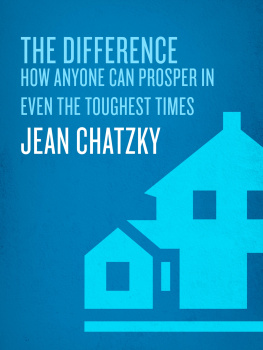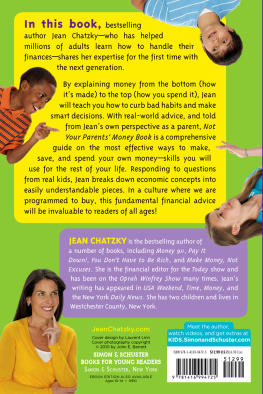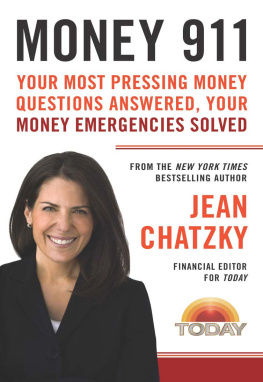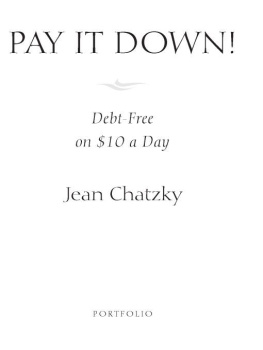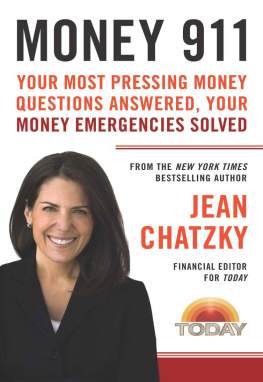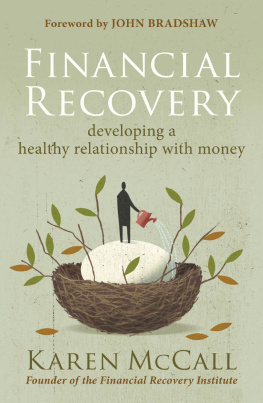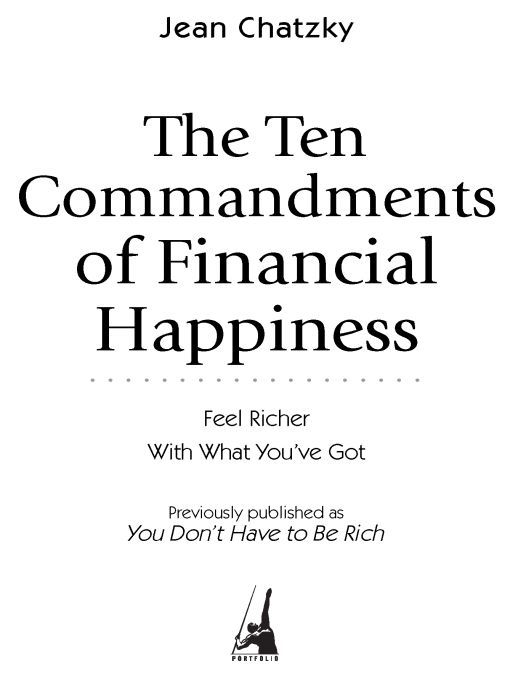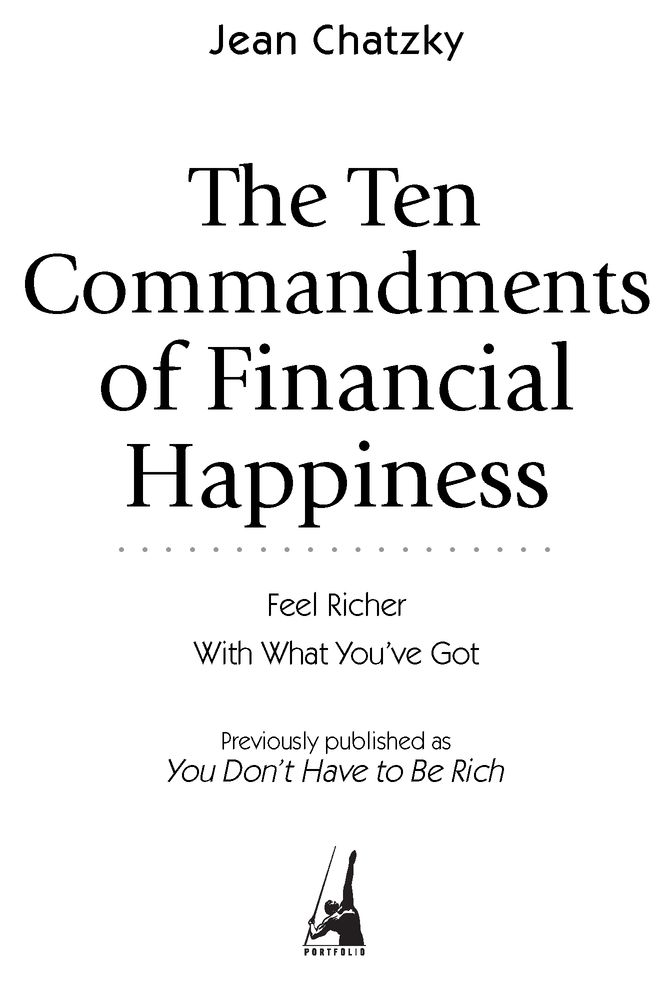Table of Contents
PORTFOLIO
THE TEN COMMANDMENTS OF FINANCIAL HAPPINESS
Jean Chatzky is the financial editor for NBCs Today show, has a monthly column in Money magazine, and is a featured columnist for USA Weekend and Time magazine. She is the author of Pay It Down!, Talking Money, and The Rich and Famous Money Book. She lives in Westchester County, New York, with her husband and children.
For Jake and Julia
Acknowledgments
This project could not have come together without the efforts of some seriously talented and incredibly supportive individuals. I am particularly grateful to:
Bob Safian, managing editor of Money magazine and the best boss on the planet, who backs me at every turn. Thank you for giving me free rein on this one.
Literary agent Richard Pine, who coerced a proposal from me when I didnt think I had one to write, then shepherded this project through to completion (and who taught me to think big).
Publisher Adrian Zackheim and the rest of the team at Portfolio, particularly Will Weisser and Stephanie Land, for lending form to this idea, then massaging the manuscript into shapeand making the process a pleasure.
Sheryl Tucker, Andy Borinstein, and Douglas King at Money magazine and Annie Weber, Vanessa Downing, and Cathy Butler at RoperASW, who helped design and conduct the research and then analyze the findings. I never knew numbers could tell such a great story.
Denise Martin, Patricia Luchsinger, Betsy Alexander, Nellie Huang, Nick Pachetti, Amy Wilson, Jonah Freedman, and Connie Kurz, my colleagues at Money, Today, and USA Weekend, for their support and guidance along the way.
The two Amys (Wolfcale and Mahfouz), publicity mavens extraordinaire. Thank you for the amazing effort.
Nancy Kay and Richard Liebner at N.S. Blenstock, for their ongoing support with this project and so many others.
The wonderful and generous sources who shared with me their own happiness findings: Daniel Gilbert at Harvard University, Ed Diener at the University of Illinois, Richard Easterlin of the University of Southern California, Robert Lane at Yale University, Andrew Oswald at Warwick University, David G. Myers at Hope College, Tim Kasser at Knox College, Affluenza editor John De Graaf, Manfred Garhammer at the University of Bamberg, Jon and Eileen Gallo of the Gallo Institute, and particularly my Money magazine colleague Jason Zweig, who not only opened up his own meticulous files but was always willing to talk about happiness despite having his own book to finish.
The financial experts who helped pull together the rest of the picture: Steve Norwitz at T. Rowe Price, Eric Jacobson at Morningstar, Harold Evensky of the Evensky Group, Ross Levin of Accredited Investors, Bruce Tulgan of Rainmaker Thinking, Jim Ball of The Goals Institute, Keith Gumbinger of HSH Associates, Jim Doyle of Upromise.com, Susan Beacham of Money Savvy Generation, and Feng Shui practitioner Sandra Goodall.
Reporter Brian B. Reid, who did great work finding real people willing to talk on this topicand all of those people who shared their stories with him and with me.
Norm Pearlstine, John Huey, Dan Goodgame, Leah Rozen, Andy Serwer, David Handelman, Wally Konrad, Elaine Sherman, Steven Levitsky, Jeri Kronen, Diane Adler, Laura Mogil, Debi Epstein, Roberta Socolof, and Jan Fisher, who read chapters and proposed titles, for their helpful suggestions and additions to the manuscript (youll find many of your potential titles are now chapter headings).
Finally, my familythe Shermans, the Chatzkys, and especially my husband, the MayorI wish you all happiness on your own terms.
Preface
Personal finance experts like me tend to get a little caught up in the minutia. We focus on where you can find the lowest rates on a mortgage, and which credit cards will give you the most frequent flyer miles for you money. In a world of dollars and cents, well hone in on the cents every time. We do that because those are the easy answers. You can do enough research on various credit card programs so that you knowas you put pen to paper or your finger to the keyboardthat youre absolutely, positively, 100 percent right.
But when it comes to the intersection of your money and your life, those small knowable details pale in comparision with the bigger, harder, more emotional ways in which you and I have to deal with money every single day. In the context of life, money becomes a relationship issue (recall the big fight you had when one of you wanted to spend thousands on a flat-screen TV and the other thought the current TV was just fine). Money becomes a parenting issue (are you helping your kids or spoiling them when you buy the things they ask for at the mall?). Whether were looking to save time, get organized, or just get from point A to point B, we have to weigh the money it will cost us with the potential reward.
And that means learning to look at money through a different lens. The research that I did for The Ten Commandments of Financial Happiness taught me to do that. It impressed on me the importance of adopting certain basic financial habits that take the work out of managing your money so that you can focus on the more important things in life.
In the hardcover text, those habits were grouped in a chapter titled The Ten Commandments of Financial Happiness. Despite the fact that they came late in the book, they struck a chord. People have come to me to tell me that Commandment 2pay your bills as they come in rather than all at oncechanged their lives. Or that since they incorporated Commandment 9draw a line in the sandinto their lives, they feel so much better.
Those Ten Commandments are what this book is really all about. Theyre about a system that enables you to worry less about your money and enjoy it more. You dont have to adopt all of them. The research shows that as well. Even a few performed consistently can make a big difference in your outlook on life. I know. They have in mine.
Jean Chatzky
New York, 2004
Introduction
It was shortly after September 11a time of turmoil in the markets, when it was impossible to read the newspapers, turn on the television, or even listen to the radio without feeling out of control financiallythat I started to think about the effects money has on the happiness of individuals. The shenanigans of corporate executives in far-flung locales from Texas to Connecticut to Mississippi had sent stock prices plummeting. Wall Street analyststhose supposedly neutral parties who tell us what to buy, hold, and (all too rarely) sellcould no longer be trusted. Neither could the accounting firms that were supposed to keep companies on the straight and narrow. The measures that usually moved stocks in a positive directionfrom cost-saving layoffs to corporate stock buybackshad stopped working their magic. Even speeches from the President of the United States and (can you believe it!) Alan Greenspan couldnt seem to turn the indexes around.
And weyou and Ithe individual investors and consumers sitting at home, pouring money into our 401(k)s, putting money into college savings accounts for our kids, counting on these companies to continue to employ uswe couldnt do a


